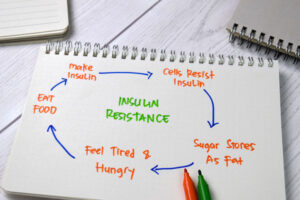
Everyone knows about diabetes, but what about the insulin resistance that comes first? Identifying and treating high insulin early is the key to preventing pre-diabetes and diabetes. Many more conditions, such as polycystic ovarian syndrome (PCOS) and heart disease, are easier to manage when insulin is addressed from the start. Long before that rising insulin manifests into a “disease,” it can cause a whole host of unpleasant symptoms such as sugar cravings, fatigue, and easy weight gain.
The good news? Insulin resistance responds well to diet changes and natural medicine! The bad news? Most patients only get screened for diabetes, so high insulin can be overlooked for years, sometimes decades. I recommend a test for fasting insulin to anyone who notices a change in metabolism, appetite, weight, and energy. To better understand why insulin sensitivity is so important, let’s do a quick review: Insulin is a hormone produced by the pancreas when we eat. In fact, it is the main hormone that regulates our blood sugar and metabolism. It tells cells to take up glucose (sugar) from the blood to use for energy production and growth. When you stop producing it, which happens in Type I Diabetes, your cells starve because they can’t absorb the glucose from your blood. When you overproduce insulin, usually due to a high sugar diet, a very different process happens. Your cells are bombarded with so much of the hormone that over time they stop responding. Blood sugar keeps rising because it can’t get into the cells, and the pancreas puts out even more insulin, feeding the problem. Insulin resistance is self-perpetuating: High blood sugar —> High insulin —> Insulin resistance —> High blood sugarSo what causes high blood sugar in the first place?
Usually, high blood sugar is caused by a diet high in sugars and simple carbohydrates. White flour products, candy, soda, and juice are all examples of foods that spike blood sugar and increase insulin levels. Chronic stress, certain medications, and diseases such as Cushing’s Syndrome can also lead to high blood sugar and insulin levels.If you need to bring your insulin down?
Here are a few basic tips you can start today:
- Start your day with protein. A protein-rich breakfast will help to stabilize your blood sugar for the day which means fewer spikes in glucose and insulin.
- Interested in intermittent fasting? Start with 14 hours 3 days per week, and break that fast with protein.
- Add extra fiber to each meal. Ground flax, chia seeds, berries, nuts, and seeds are easy to add to a dish or snack between meals.
- Get a full 8 hours of sleep every night to help keep your stress hormone, cortisol, in check.
- Try a daily cinnamon supplement which has been shown to lower fasting blood sugar levels.
- Replace flour-based starches like bread and pasta with beans, lentils, quinoa, steel-cut oats, brown rice, or extra vegetables.
- Love fresh fruit? Don’t worry about snacking on apples and other fresh produce, just pair it with a bit of protein to avoid a blood sugar spike.
